#tragic hero vs modern hero
Note
hiya! i was wondering if you have a post on how to create a god/deity for your story? thanks!
Writing Deities
What Type of God?
The form and characteristics of your deity characters will depend highly on the overall worldbuilding and mood of your story. Here are some common deity “types”:
Human-like gods who make their own share of mistakes, are tempted by desires (think of Greek/Roman Gods)
“God” as a formless, omnipotent force of the universe that directs people’s fates
An omnipotent God vs, Many gods in charge of one element or thing
Gods who command large spheres of elements (like sea, fire, war, etc.) vs. God of petty things (e.g. the God of morning coffee)
The appearance of a God will reflect what the people of that culture look up to. They can resemble an animal, have almost monster-like features or just look human more or less.
The Implications of Immortality
A god would generally be immortal, and this would be a major difference between your superheroes and a god. They cannot die and therefore are free from the fear of death, which is the most powerful motivator for our heroes.
This means that you’ll need to assign a flaw so that you can kick your deity characters’ butts. Often, this comes from the very fact that gods are immortal.
A tragic backstory of the god losing a human they cared about
A god who wants to die
A god who was kind and compassionate, but grew irritable and tired after seeing eons of human stupidity.
A god who regrets creating the world
Set up limits of their power. Gods cannot invade each other’s territory or they cannot bring back people from the dead. Or they aren’t allowed to roam in modern clothing, and your god happens to hate armor.
In essence, deity characters exist to question the reader’s belief about an aspect of life. Gods are often personifications of abstract concepts and through them you can convey a message about what you think is important.
For example, a Love Goddess may be a shriveled hag while her daughter, the Goddess of Passion, may be a standard beauty. This immediately conveys the message that a pleasing appearance is no substantial factor of true love.
A God’s “Personality”
The most important part of a god’s personality is going to be their attitude towards humans, since the purpose of a god is to command over and protect lives other than theirs.
How does the god feel about being assigned a “job” at birth? Or did they choose to be a god (any regrets)?
Generally, a god’s personality would be linked to the thing they command. The god of the sea may be capricious but surprisingly open-minded; the god of trees may be generous but stubborn, etc.
You can:
Summarize the god’s motto in a single sentence. It can be something philosophical or even comical, depending on the mood of your story. (e.g. “Love is cruel,” “Donuts are always right.”)
What kind of humans the god would like the most vs. hate the most
In general, are they compassionate/loving or sadistic/pessimistic?
─── ・ 。゚☆: *.☽ .* . ───
💎If you like my blog, buy me a coffee☕ and find me on instagram!
💎Before you ask, check out my masterpost part 1 and part 2
💎For early access to my content, become a Writing Wizard
#writing#writers and poets#creative writing#writers on tumblr#writeblr#poets and writers#helping writers#let's write#creative writers#resources for writers#writing process#writing community#writing inspiration#writing advice#writing ideas#writer#on writing#writing prompt#writer stuff#writers block#writerscommunity#writers community#writers life#write it#writers#references for writers#writing ask#writing a book#writing asks#writing about writing
186 notes
·
View notes
Text
I do love how in the Odyssey you spend the first four books following Telemachus, hearing with him from everyone else how great and wonderful Odysseus is, and how tragic it is that he isn't there. You hear from Nestor and Menalaus and Helen, and even Athena and those left at Ithica are building Odysseus up as a great hero. The reader gets an idea of who he is and a sense of the pressure of Missing Legacy To Uphold for Telemachus.
And then we follow Hermes to Calypso's Island and still no Odysseus while Hermes and Calypso hang for a bit. And finally we meet the titular hero almost 5 books in, and the very first thing he's doing is weeping on the beach.
Which is such a facinating--and, to our modern ear, kind of funny, since tears arent """manly""" "hero" behaviour--juxtaposition of Great Hero vs man crying on the beach, and I love it so much. It instantly changes him from a hero of renown, a huge legendary figure Telemachus could never live up to, to a man who just wants to go home.
#wren rambles#the odyssey#Odysseus#telemachus#desperate to pick apart telemachus' part in the story#because hes SO IMPORTANT#just that. arc of missing father->legacy to uphold->finally meeting him#and the way people keep telling him to be like Orestes#ahhhh#the THEMES#ALSO from a storytelling perspective the formating here is WONDERFUL#because weve spent a decent chunk of time hearing about Odysseus through the eyes of his friends and comraids#and like telemachus likely have built up an image of him#so to have his very first act in the whole story be CRYING is raaahahh#and he cries SO MUCH in the story
116 notes
·
View notes
Text
Not to claim Godzilla x Kong was a deep film, but credit where it’s due, it has by far the most respectful portrayal of indigenous people in all of the Kong films.
This is not a high bar and I’m NOT saying it’s the pinnacle of progressive film work, but it’s interesting nonetheless.
Spoilers below, of course.
For those of you who haven’t seen any of the older Kong films outside of the Monsterverse, the general plot beat is that a wealthy businessman/philanthropist/greedy asshole goes to Skull Island to find something new to make a lot of money (film for the OG/Peter Jackson and Oil for the 70’s film), and comes across a tribe of “barbarian” natives who kidnap the beautiful white woman whom they sacrifice to Kong, whom they worship.
It’s such a cliche that even Peter Jackson does it in his 2005 film (and it’s possibly even more racist than the older ones):
youtube
youtube
youtube
As you can see, there is a very familiar pattern
The Iwi tribe of the Monsterverse is handled very differently
In Kong: Skull Island, it actually does try to play into previous viewers perceptions; we meet the Iwi as the protags stumble upon their village ruins and are surrounded by. Tension is tight, and it looks like it’ll be a repeat of the previous films… until the character of Hank Marlow arrives and diffuses the tension entirely, revealing that the Iwi have been generous and caring hosts to him.
And yes, while they do worship Kong, it’s not out of fear, but rather that Kong protects them from the hazards of Skull Island. The Iwi are the ones who help the crew get a working ship and aid them in escaping the island.
This is followed up in Godzilla vs Kong, where we tragically learn that a massive tropical storm (I think implied to be due to King Ghidorah hurricanes) sank the entire island and left Jia as the sole survivor of her tribe, saved due to Kong protecting her from the rising floods.
Kong and Jia are then seen as a near inseparable duo, further twisting the “beauty and beast” dynamic of the previous films, making it more about how they are both alone except for each other. Kong even learns sign language from Jia in one of the best movie reveals of the series:
youtube
It’s even Jia who is able to give Kong the morale boost to save Godzilla from Mechagodzilla.
And then we get into Godzilla x Kong. Kong and Jia, while having a new home, still feel isolated because of their cultures (or lack thereof) and make excuses to see each other as much as possible. Which is turned on its head as Kong finds other Apes and the Iwi tribe have returned (or at least) an offshoot of them, as the protectors of humanity who calls Godzilla to their aid.
I was a bit wary of making them telepathic, but I liked that they used it more like a separate language than a superpower, with Jia serving as that bridge as she finds her culture, her adoptive mother accepts that Jia may want this life more than one back home (where she felt out of place), and Jia becoming ANOTHER bridge as she helps resurrect Mothra who goes onto make Godzilla and Kong form an alliance!
Ultimately, Jia parts ways with the Iwi on good terms to live with her adoptive mother, happy to know there are people of her culture she can visit and Kong lives on with his people.
But I especially appreciate a moment in the film that pretty much lampshades the older Kong movies.
One of the characters is filming himself and others as they venture into Hollow Earth, desperate to get his fame and fortune in making people realize he was a hero and not a conspiracy theorist (he was a spy for Apex Labs, the ones who built mechagodzilla in the first place). Another character is an animal doctor and naturalist, who points out that, historically, native populations don’t tend to do well when exposed to the modern world.
Add on to the fact that the Iwi are telepathic and know how to use crystals to alter gravity in Hollow Earth, they would absolutely be the target of government operations and experimentation. Aka, a far more grand version of what happens in the older Kong films.
The film ends with the footage not being used and the Iwi living in peace, having Mothra once more to protect them.
Like I said, it’s not groundbreaking stuff, but I appreciate how different it is.
#godzilla#kong#king kong#monsterverse#godzilla vs kong#godzilla x kong: the new empire#kong skull island#kong: skull island#Iwi tribe#Jia#Youtube
144 notes
·
View notes
Text


PROPAGANDA
R. M. Renfield
Mentally ill queer man writes mentally ill queer character. 200 years later, Dracula Daily happens and everyone in their mother immediately starts poking fun at him, demonizing him, or treating him like a naive child when none of these things are true. I could write a darn essay about Renfield and his role in the story. His status as a servant of Dracula is kept hidden from our heroes despite how obvious it is to the modern reader, and it turns into a striking example of dramatic irony. But at the same time, he's not a simpering servant; he's psychotic and Dracula feeds his delusion for his own gain. His death isn't a sacrifice, it's a tragic end to a story about the effects of isolation on the mind and the suffering that can come about from people refusing to listen to those who aren't like them. Pretty damned amusing, then, that absolutely no one seems to listen to the words that come out of his mouth.
Izzy Hands
people hate this guy. people HATE this guy. and for what? "hes abusive" you are out of your MIND if you actually think that. let middle aged men be messy jilted lovers, goddamn!!!!
Oh my gods, fandom has lost their minds with this one. People act like Izzy is the devil himself and actually it's his fault that the main love interest of the show has ever done anything wrong ever. Every bad thing in the show? Actually Izzy's fault. I've seen people literally, actually say he deserved his abuse and that it's his fault his abuser hurt him and that he liked it. I have seen people unironically say that his abuser should have killed him. I've seen people say that Edward Teach (y'know, literal Blackbeard who explicitly says in canon, with his mouth, "I love a good maim" would never have done anything violent ever if it wasn't for Izzy's manipulation. This is, of course, ignoring that Ed's first acts if violence were before he ever even met Izzy
So Ed and Izzy have a toxic relationship and do bad stuff to each other. And Izzy fans will minimize the shit Izzy did while bringing up what he suffered. And Ed fans will maximize the shit Izzy did and forgot the rest. Honestly I'm might be bringing a lot of anger on the blog for this, sorry.
#misrepresented morally grey#round 2#bracket c#both bracket#dracula daily#r m renfield#our flag means death#izzy hands
101 notes
·
View notes
Note
Sorry, I'm asking here because asks aren't on your doomreed account, but do you have any fic recs for them ? You and vinnies art have intrigued me 😭 they both seem like such wet cats in different ways, and I love that
help i didnt know asks were off fixed that now thank you... I have two fics i keep in my back pocket as like, exemplary distillations of their whole thing (one in college vs one of their usual superhero stuff,) these are;
Supersymmetry and Night Blooms
Rly good examples of their usual shenanigans, the second one is directly based on a canon comic issue that *feels* like fanfic by a prolific yaoi author, the first is set in a modern-time re-imagining of the fantastic four where they meet in a supergenius internship thinktank for gifted youngsters. There's other fics that are good but i think they might be super confusing without canon context! which leads me to my second point. After you read these fics...
A lot, and i mean A LOT of official doomreed stuff feels straight up like fanfic. Either because its so beautifully woven or insane in concept (doctor doom points a gun at the real life Jack Kirby and Stan Lee to get himself written back into reed's life in his 3rd ever classic appearance, in the 60's, THAT'S the bodyswap issue)
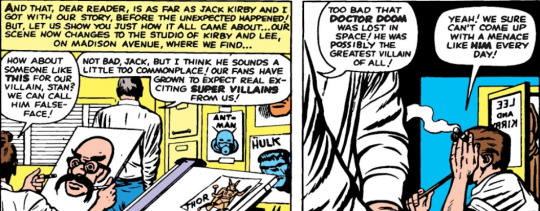
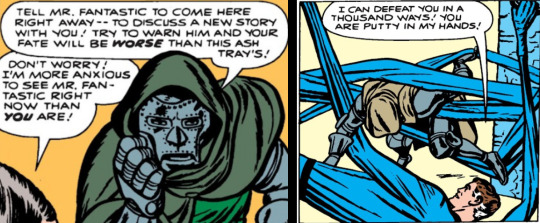
or because the literal authors themselves come out to say 'they're soulmates' or 'they're in love' and Im talking abt this:
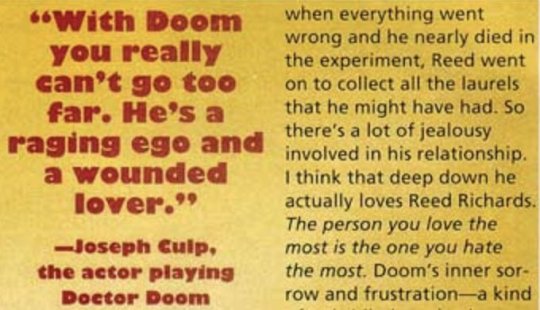
(^joseph culp, the first ever doom actor from 1994)
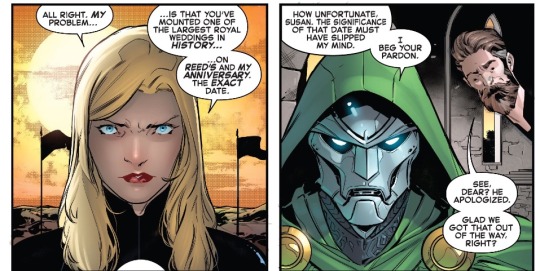
(^fantastic four (2019))
I've got even more stuff under the cut!! AND recs!!! CLICK! v v v
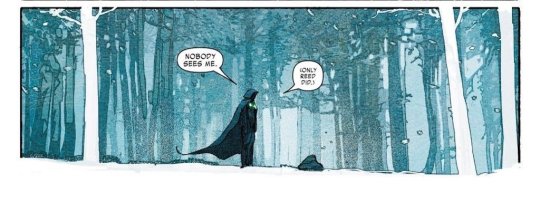
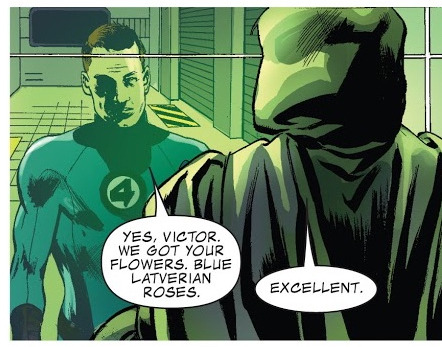


(^jonathan hickman, author of arguably the best FF saga & Secret Wars (2015)!!!)


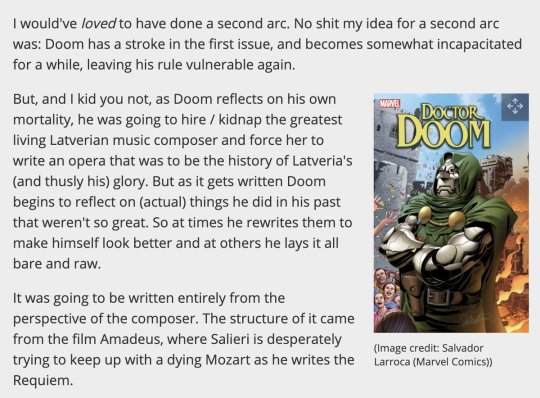
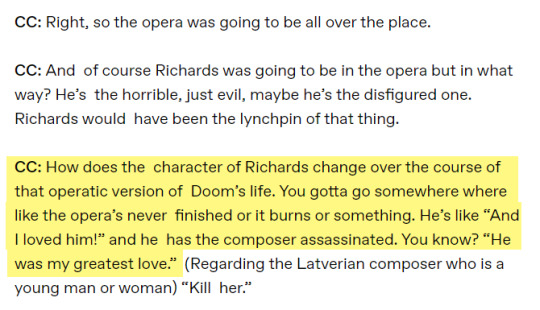
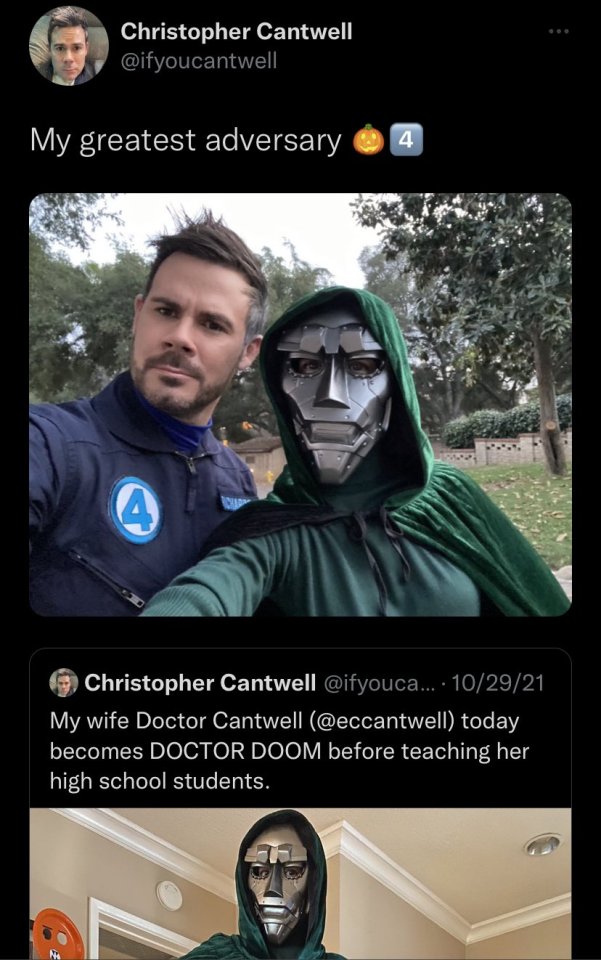
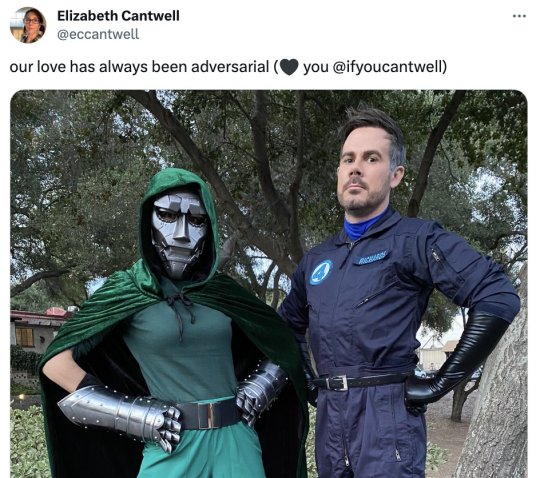
(^Cantwell, author of the Doctor Doom comic!!)
These are excerpts from the canon fantastic four book, DOOMGATE:
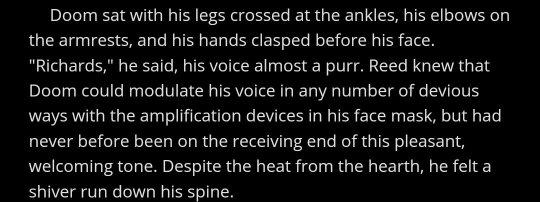
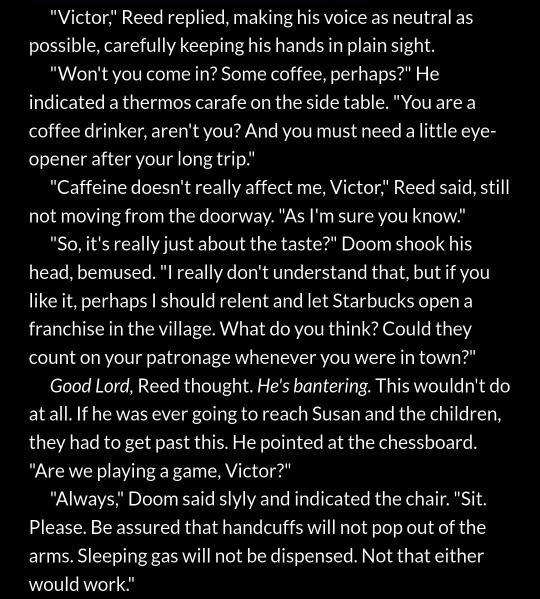
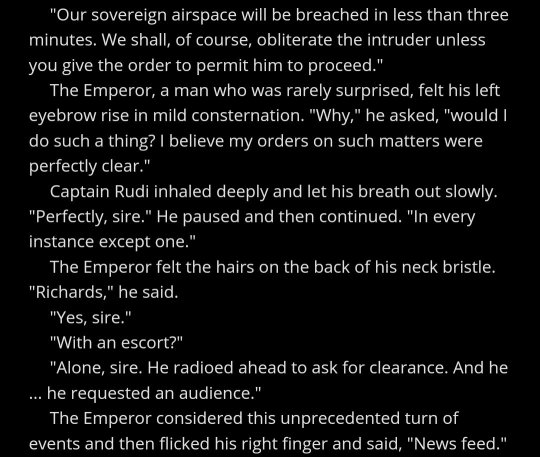


There's even an RPG INSTRUCTION MODULE based on the idea of an earth where Reed & Victor partner up in college, Reed dies a tragic death (via their lab experiments) and Victor assumes such a traumatized widow role in his honor that he grows up to be a golden hero and protector of earth LOL (still a bit nuts):
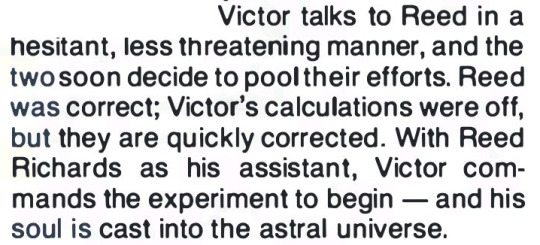
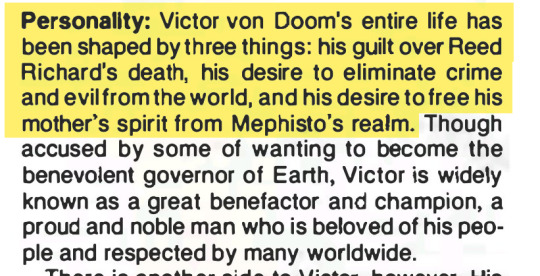
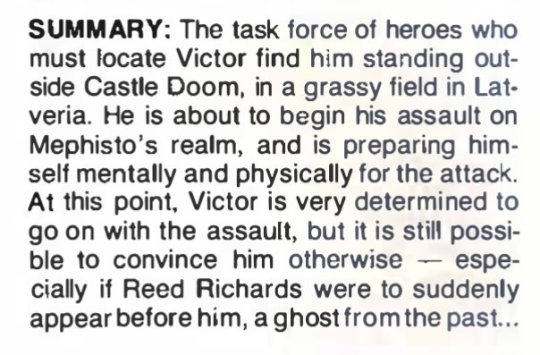
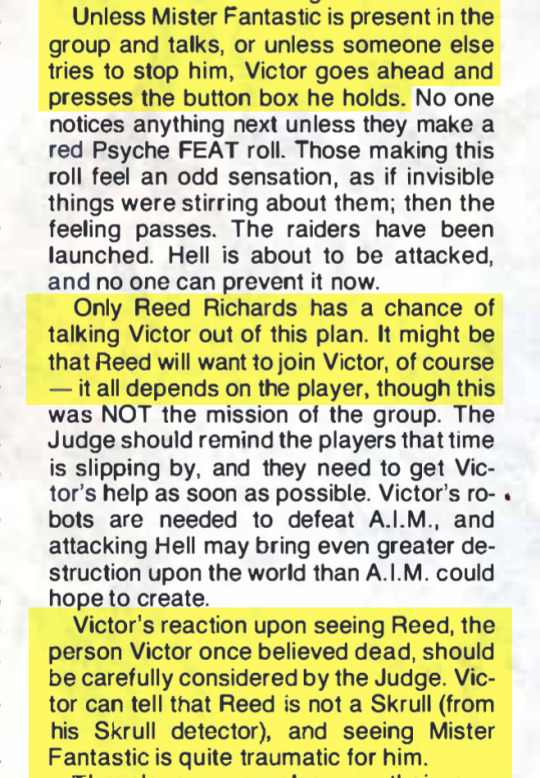
This is not even to touch on the breadth of all their comic issues and little moments together. Victor canonically delivers Reed's second child and he chooses her name! Shes treated like his child too and calls him uncle doom!!
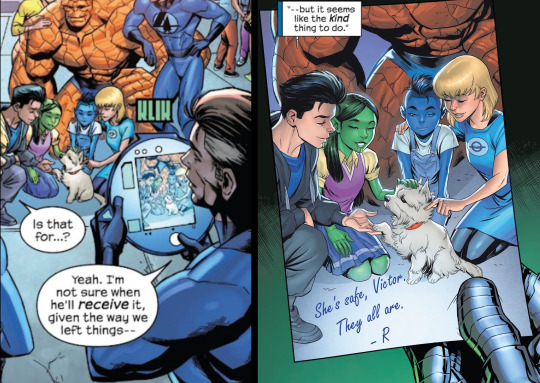
...Victor even asks Reed out on candlelit dinner dates for a yearly Latverian holiday!
In fact, that's the great starter doom/reed issue i keep recommending: read [ My Dinner With Doom right here. ]
If you enjoy that, check out my [ broader post guide for doomreed reading. ]
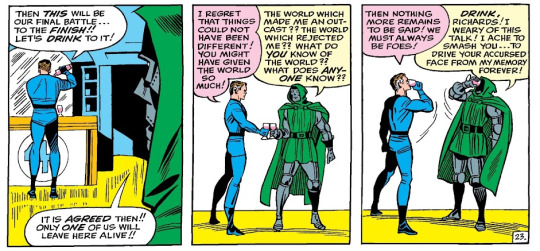
Still on the fence? try out these single comic issues:
Doctor Doom:
*Fantastic Four (1961) annual 2 (Classic origin of Doom issue)
*Some call it MAGIC (the introduction of Doom's struggle w/ the devil for his mother's soul)
Doomreed:
*Marvel Two-in-One (2017) annual 1
*Marvel Two-in-One (2017) #11 (2nd fic i linked is based on this!!!!!!!!!)
*'Duel Intentions' short story
*Doom 2099 (2019)
*Fantastic Four #700 special
*Shame Itself (noncanon satire mini)
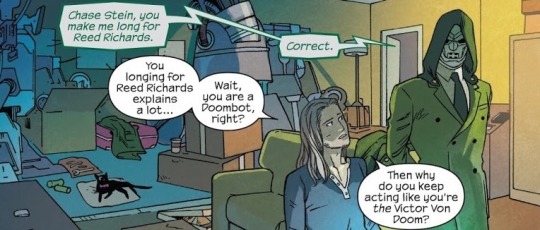
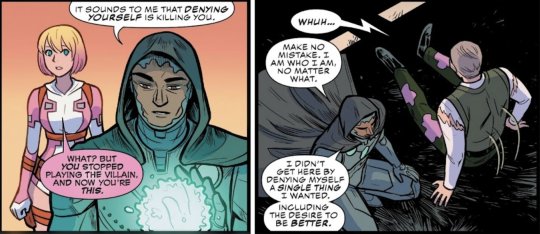
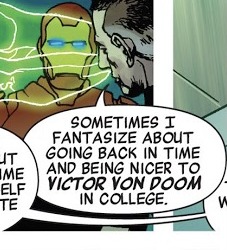
Anyway I've had a lot of fun reading these series generally and their big, year-spanning arcs are incredible. People hype up Secret Wars for a reason, Hickman's fantastic four builds up a really compelling doom/reed epic of cosmic divorce proportions. And its about love! And Forgiveness!
#hexposts#doomreed#meta tag#victor von doom#reed richards#fantastic four#mister fantastic#doctor doom#mr fantastic#dr doom#fantastic 4#marvel comics#FF#fic rec#long post
147 notes
·
View notes
Text
why lyney x aether just makes sense
no traveller ship has ever rlly worked to me (other than ayaka bc it was very heavily hinted in canon) UNTIL TODAY. HERE IS MY FORMAL DISSERTATION ON WHY LYNETHER WORKS
neither of them have pairs - genshin purposefully does this thing where they pair up characters (eg: chongyun & xingqiu, jean & lisa) which is why there are so many popular ships in the fandom. i think lyney's effective pair is meant to be lynette & aether doesnt have one bc hes meant to be a player-insert but that leaves SO MUCH ROOM bc when you think about it the closest thing lyney has to a love interest IS AETHER
siblings - both of them are elder brothers and both are TWINS . they also both have a youngest sibling figure (freminet and paimon; dont tell me paimon isnt a younger sister figure bc if u open a modern au ALMOST ALWAYS she is presented as "aether and lumines younger sister") their backstories are similar (losing their other half) so they canonically understand each other (There's nothing in the world I treasure more than my family, so I know what it must be like for you -Lyney, Friendship LV4) THIS LEADS INTO MY OTHER POINT
the "i see past your mask" trope - this is a very popular trope (and one that ngl kills me everytime i read it bc it preys on the human desire to be fully understood) BUT it was made for lyney . if youve watched ouran highschool host club HIKARU AND KAORUS "we are the only two who understand each other... until haruhi arrived" IS NOT DISSIMILAR TO WHAT COULD HAPPEN WITH LYNEY, LYNETTE AND AETHER . and lyney was BORN to fit this trope bc he already has the whole fake, charming, extrovert persona he puts on. ("Actually, the real me is nowhere near as outgoing or chatty as I appear. (...) I think people would feel sorry for the real me." -Lyney, friendship LV6)
narrative - a big thing about ships is they need to have a faucet for tension . like xingyun is extremely hinted in canon but its nowhere near as popular as kavetham and zhongchi. why? because theyre just childhood best friends. nothing interesting about it. zhongchi especially is hugely popular bc of the potential for reconciliation after the osial arc (zhongli's "im sorry for manipulating you. it wasnt all fake i swear" sorta thing) AND YK WHAT ELSE HAS THAT??? FURINA REVEALING LYNEY AS FATUI IN THE TRIAL "im sorry for lying about my identity. it wasnt all fake" the core that makes ships like satosugu and zhongchi tragic is the betrayal of trust, and, well... ("Nothing could make me happier than having your trust." -Lyney, Ascension 4)
binary opposition - why is satosugu so popular? probably because its the whole 'cruel murderer villain' vs 'strongest hero' trope and audienced like sun vs moon . okay . AETHER IS LITERALLY THE HONORARY KNIGHT OF MONDSTADT, HERO OF LIYUE, ENEMY OF ETERNITY, FIRST SAGE OF BUER and lyney is THE FUTURE SUCCESSOR TO THE HOUSE OF HEARTH . the villain of genshin impact (currently) is the fatui so you cant get better than this.
canon hints - even if ships would theoretically work well and have potential for tension, they need to be grounded in the source material. so does lynether have that?
"Hmm, your eyes are like topaz, precious, pure, and lovely. I like them! I've decided — I'm going to put on a show just for you."
"I thought it was the radiance of the sunlight on my skin that I felt — turns out it was your radiance all along!"
"I should probably emphasize again that I'm rarely so open with anyone — I guess it's because you're not just anyone."
"It seems we're both keenly interested in each other. Well, know that the honor is mine! Haha, relax. I couldn't ever tell lies to your mesmerizing eyes — not even if I tried!"
"Doing all this for me... Are you trying to steal this magician's heart, by any chance? Well, in that case, congratulations, my dear apprentice — or should I say, "companion." For you have succeeded!"
canonically, lyney gets upset when aether thinks abt other things when hes in fromt of him. HES LIKE A POUTING CHILD THAT GOES "pay attention to me!!!" LMFAOO
the rainbow rose, need i say more? lyney literally gets flustered when lynette brings it up too pfft
most of the stuff he says can be attributed to lyney just being a flirt but in cases like the rainbow rose scene where he literally does it BECAUSE HE KNOWS AETHER WOULDNT GET IT... there is no platonic explanation bc if there was, if it meant Friendly Love THEN THE DEVELOPERS WOULDNT HAVE ADDED THE NOTE ABOUT LYNETTE NEVER GETTING ONE considering shes the most important person to lyney...
in conclusion, ive rambled for too freaking long but THEY WORK . AND THERES ALSO POTENTIAL FOR A WHOLE LONG DISTANCE YEARNING ARC BC AETHER ALWAYS TRAVELS SO... FANFIC WRITERS CHOP CHOP
#lynaether#genshin lyney#lyney#genshin impact lyney#satosugu#zhongchi#kavetham#aether#genshin impact#genshin aether#fontaine#lynette#paimon
57 notes
·
View notes
Note
I have a question about Zeus and Kronos. SEVERAL actually. Their relationship gets more confusing the far you dig into it.
How did the ancient Greeks see their relationship? How did they see the whole conflict between the Gods and the Titans?
In modern works, Kronos and the Titans are almost always portrayed as evil, monstrous tyrants, and Zeus and the Olympians as the young heroes that bring them down.
However, in Greek Mythology, Kronos' reign was the Golden Age, an utopic and paradisiac time of peace, happiness and prosperity, and Zeus is the main responsible for bringing pain, disease, and death to humankind through Pandora.
And to make matters more confusing, patricide was a huge sin in ancient Greek culture.
Was Zeus and Kronos' story a heroic tale of order overcoming chaos, or a tragic "Paradise Lost" type of scenario? Is Zeus a hero for deposing his father, or fallen hero that only escaped divine retribution because he himself is a god? Who was in the right in the conflict between Olympians and Titans? How am I supposed to interpret Hesiod's Theogony?
This is a very complex question that opens the door to many, many possibilities. But long story short: in the Olympians vs Titans conflict, the Titans were definitively in the wrong, and yes we are supposed to root for the Olympians.
Remember, the Olympians are supposed to be the "big goods" of Greek mythology - or at least, mostly positive figures. The enemies of the Olympians are by extension our enemies because the Olympians represent order and civilization. The Gigantomachy is the best representation of that, as the Giants were literaly designed to kill and destroy and nothing else. Same thing with Typhon, chaos and terror embodied.
Now what was the problem with the Titans? Long story short, many things. But what we have to understand is that the Titans are being supposed to represent... yes chaos in a way, but also a more brutal, primitive form of the universe. Yes the Titans are gods like the Olympians - but they are not the same kind of gods. Older, rougher. For example take the Olympians - they are kings and queens over the principles they control. Poseidon rules over the sea but is not the sea ; Zeus' decisions control the weather but he is not the weather. When we go by the Titans, however, we have beings such as Helios who was the literal sun or Oceanos who was the literal ocean. The Titans reflect the primal forces of nature, the rough and brutal, less humanized elements, more personifications and embodiments than deities as we understand them today. So what was the object and purpose of the Titanomachy? The "taming" and ordering of the world. Some Titans sided with the Olympians, and thus became more human and more "ordered" and found a place for themselves within an organized world. Themis for example, who as the embodiment of the Law and of Justice, would of course choose the Olympians' side. Also note that, outside of Themis, none of the Titans reflected any concept or principle part of a civilization. The Titans were violence (Iapetos whose name means "piercer", and Kronos who castrated his own father), the Titans were animals (many are the titans with strong animal motifs), the Titans were the sea and the moon and the sun and the light and the earth... They were literaly born out of the sky and earth. But what came with the Olympians? When Zeus got onto the throne, he started creating new gods through his many marriages and alliances: he brought forth Apollo of the art, Athena of wisdom and peace, Artemis of the hunt of the wild, Hermes of all the sciences, and the Horai, and the Muses, and sometimes even the Moirai themselves. Zeus organized the world and brought many of the concepts we cherish so much today.
Not only was the problem with the Titans that they were primordial and brutal forces of nature, but the problem with the specific Titans that went at war against the gods is that they literaly refused to let fate be and time pass. Kronos' flaw and fault is the most common of all mythology: fighting an oracle, trying to destroy a prediction, trying to avoid his fate. He was foretold he would be overthrown by his son. Not destroyed, not mutilated, certainly not killed (because gods cannot die, they are immortal), but just overthrown. And he refused this. He refused to have his throne taken away from him - he refused to let generations change, to let youth come. He had obtained his throne for right reasons (he punished the sins of his father) and yet through bad means (mutilating his own father). As such he got the throne but was fated to let it go, and know a "lesser" version of what he had inflicted upon his father. But he refused this.
Not only that, but he actually ended up repeating the mistakes and crimes of his father Ouranos. By not just bringing a stasis, but by literaly causing a regression. Imprisoning back the Cyclops and Hekatoncheires he had set free ; and then swallowing back into his belly the children he brought forth, literaly reversing the natural cycle of time. So Zeus' war against Cronos was justified to allow the world to continue its own maturation, and evolve further. And from a world of brutality, barbary and regression, we reached an age of order and civilization.
Now let's take the second side of the problem - the whole "Ages of Mankind".
It should be recalled that the Ages of Mankind story comes from Hesiod's "Of Works and Days", not from his "Theogony". And "Of Works and Days" is not supposed to just be a cosmogony like the Theogony, but rather a didactic work. It isn't about mythology per se, as the true topic of the work is agriculture, and all sorts of advices on how to take care of your field, woven with philosophical and moralist lessons about the importance of hard work. The mythological story woven in the work is meant to be an illustration of why humanity has to work, and is tied to all sorts of socio-philosophico messages, making it closer to a fable in many ways. It should also be taken into account that the "Ages of Man" story is tied in "Of Works and Days" to the legend of Prometheus, Epimetheus and Pandora. A legend also told in "Theogony"... but with slightly different details. For example, in the Theogony the story is very misogynistic as the curse of Zeus is... literaly women. As in, women are evil, and that's it. The version of "Of Works and Days", slightly less misogynistic, is the one with the famous Pandora jar later turn Pandora 's box, and there the evil is contained within the jar and is all a convoluted plan to force the "clan" of Prometheus to end up cursing the humanity they favored. Hesiod was never afraid of contradicting himself - even within the Theogony you have opposite stories, such as how in one part the Moirai are aughters of Zeus and Themis, in another daughters of Nyx that predated Zeus.
Anyway, all of that being said, I want to point out something important: in the Ages of Man storyline by Hesiod, Zeus is not supposed to be the one that caused the misery of mankind. At least not directly. It is true that the Golden Age and the first humanity is said to have existed/been formed under the rule of Cronos, while the Silver Age, which was a downgrade, occured when Zeus arrived on the throne. But the text does not say that Zeus was the one who caused the downgrade of humanity. There is definitively a change, an evolution, but it doesn't mean it is Zeus that "corrupted" humanity. In fact, the text does say that Zeus kept around the first humanity as powerful spirits to help, guide and enrich the following humanity. And Zeus' "rule" is not all bad, as there is a mention of one of the humanities brought forth under him being the Heroic Age, which is considered one of the best humanities after the Golden Age. The legend isn't actually about Zeus "ruining" humanity in any way, as the message Hesiod tries to give here is rather that humanity is living through a sort of natural decline... Yes, Hesiod was quite pessimistic, and honestly you can hear a bit of the old as time rant "Young people are doing everything bad, the world is getting worst and worst, wasn't it better before?". You can literaly hear Hesiod doing his youth-hating-grandpa-rant through his tale.
Afterward, we have to consider the whole Prometheus-Pandora-Zeus triangle... And this is where things get tricky and dual. Now I can't possibly embrace the full scope of the implications of the Prometheus legend. There is a reason he is such an inspiring and powerful figure even today - and Prometheus is one of the most complicated entities of all of Greek mythology. But here is the thing I wanted to say... Yes Hesiod does say and explain that Zeus created all sorts of evil he inflicted upon humanity because he was unhappy with being deceived by Prometheus. In "Of Works and Days" it is an especially strong point because the entire text is about explaining why humanity has to work so hard, and why labor is needed by humanity, and why if we have benevolent deities we must still be burdened by chores and toil. And in general this is an answer to the very same problem that the Genesis of the Bible poses: Why would a benevolent god inflict us a life of suffering? Why do we have to work to eat and why isn't the superior power providing us, if they love us so much?
In the Biblical text, this is explained by the original sin, and by all this being a punishment for humanity's original flaw. But in the Greek texts we have something very different - as it is inflicted... to punish Prometheus? That's what Hesiod's text tells us and/or implies, by making the equation "Zeus got tricked by Prometheus, he got mad, and as a result he unleashed evils on humanity". This is what led to so many readings of Zeus as some sort of petty tyrant who wounded humanity to just get back at Prometheus. And this is partially true in Hesiod's myth... But not the whole truth. Because Hesiod insists on a very important fact: he stands as both a human speaking to other humans, and thus he cries over the misfortune of humanity and our suffering, and he explains it comes from Zeus and thus it is why it is unescapable... But he also stands as a devout Greek, as a herald of the gods' words, as someone inspired by the Muse - meaning he also has to point out that Zeus was in the right. This is why, when you compile the dual legends in "The Theogony" and "Of Works and Days", you get a very ambiguous Prometheus, more of a anti-villain by Ancient Greeks standards.
For example, the idea that Zeus got mad upon discovering he had been cheated by Prometheus is a misconception when it comes to the Hesiodic text. When you read Hesiod's text in the Theogony, what does it say? It says that Zeus was not fooled by Prometheus' trick, during the partition of the cow (when it was time to decide which part of food ent to the gods, which part went to humanity). No, Zeus, as king of the gods and superior god, is all-knowing and all-seeing, and the text does say he did knew of Prometheus' trick as soon as he laid eyes on the divided cow. He did play along with Prometheus' trick, but he got massively angry - not at being cheated, no... he got angry at the idea that Prometheus had rigged the game, and had tried to deceive him. See this as some sort of betrayal - he entrusted Prometheus with doing a fair share, and he discovers the Titan had rigged the game. Similarly, when Prometheus stole the fire, Zeus got angry because it was a theft - a theft opposing his law and decisions, an act of rebellion against his position as a king - and yes he would dislike humanity, because now they literaly had a stolen good that they were not supposed to have. Remember that Zeus is a god of justice whose deal was punishing criminals and enacting the law - so of course, a cheater, a scammer and thief like Prometheus would displease him, especially when he is not just a rebel that opposes Zeus' very rule... but also who threatens the cosmic order.
I said it before - in Ancient Greece everything was about balance ad harmony. Humanity had to be "balanced". And the actions of Prometheus literaly placed humanity out of balance. When the partiton of food came, Prometheus rigged the game so that humanity would have the best part. As a result, Zeus had to inflict an "handicap", a "flaw" to humanity so that they wouldn't be too overpowered. This was the removal of the fire. But then Prometheus stole the fire back, making humanity over-powered again. And so Zeus decided to bring the ultimate "handicap", the ultimate "flaw", the ultimate "evil" that would never go away... Because that's another thing with this legend. Zeus never takes away what had been given by the gods. When the partition of food was done, Zeus did not fight it. Zeus removed the fire yes, but when Prometheus gave it back, he did not remove it again. Once something is gifted, it cannot just be snatched back - again, Zeus respects the laws, the promises, the customs. A choice is a choice, a gift is a gift. Which is why, to weaken humanity, Zeus had to GIVE something instead of remove it. And this gift was A) in Theogony, Pandora. Because the Theogony's misogynistic take on the Pandora myth is that SHE was evil because women are by nature evil and ruin humanity. B) in Of Works and Days, the gift of the jar containing all the evils and misfortunes. Which, as I said, was a clever plan to have Prometheus' own family balance his over-powering of humanity by having THEM bring upon humanity something bad. As a way to even things out. When Hesiod evokes the person that brought misfortune upon humanity, when he describes the source of all the evils mankind has to suffer through, he doesn't speak of Zeus... He speaks of Epimetheus. Or of Pandora. But not Zeus. Zeus isn't the "culprit" in Hesiod's texts - rather it is either Pandora (for, misogynistic time, women are inherently curious and curiosity - and women in general - is evil), or Epimetheus (for being a dummy who gets seduced by pretty appearances, doesn't think of anything before acting, accepts any shining gift and is too naive for his own good, trusting both his enemies and the people he doesn't know). Oh yes, the human in Hesiod will cry and lament that Zeus is persecuting humanity... But he will make it clear it was the fault of Prometheus and Epimetheus (Pandora doesn't get much of the "culprit" treatment" because she is either seen as A, the evil Epimetheus brought into the world, B, just a tool and extension of Zeus' own will, and so not an actual "culprit").
The final piece of the puzzle that allows us to understand a bit more the tale of Hesiod is that we have to recall what was the worst crime ever in Ancient Greece. Hubris: for humanity to believe itself equal or above the gods. This was the manifestation of the Greeks' immense fear of unbalance and disharmony, when the low humans tried and believed themselves to be above their natural condition, about to rival with the immortals who were perfect in body and mind (well... absolutely perfect in the religion, much more flawed in the myths and literary works). And all the actions of Prometheus worked on bringing forward humanity close to hubris. By giving them a food better than the gods', by leaving them the full mastery of fire - especially since at the time it was the early humanity, the "golden age", those long-lived, happy, careless, ageless humans that were basically Tolkien's elves - Prometheus was literaly building rivals for the gods. Remember that what Prometheus did was seen as an act of rebellion and disobediance towards Zeus' order, ruling and position... Betrayal of his king, so to speak. Zeus had to inflict on humanity something so that they wouldn't get too overpowered or too similar to gods - he had to inflict on them something that would remind them that they were mortals, not gods, and that the world did not belong to them.
And THIS is where the "Silver Age" problems come from. As I said before, when Hesiod uses Cronos and Zeus to evoke the Golden and Silver Age, he uses them more as chronological markings than anything. By making the Golden Age Cronus' era, Hesiod places this humanity in the far, far, far away distant past, in a time beyond what is mythical - in a time before the actual organized time of the gods people knew, before what humans understood of humanity. And Hesiod insists in his texts that the ills and the worries brought by either Pandora's presence among humanity (Thegony) or by the jar of Pandora (Of Works and Days) are what caused humanity's downfall as they started aging, and falling sick, and losing their happiness, and living shorter... So long story short, it isn't because Zeus became king of the gods that the Golden Age became the Silver Age. It is rather because of the chain of events started by Prometheus - it is because of all the punishments Zeus had to took against the rebellious and cheating Prometheus that the original humanity became another. So... while yes, Zeus did send the evil, the texts of Hesiod also make it clear it is kind of Prometheus' fault. Hence the anti-villain status: yes he tried to favorite and help humanity, and thus is our hero... But he also tried to destroy the order of the world and is the reason we were cursed in the first place, so he is still a villain. Mind you, in the times after Hesiod the Greeks would come to gain a much more positive view of Prometheus - but I am focusing here only on Hesiod since it is what the question is about.
The best metaphor I would have would be : all those incidents we have today when we favorize and protect one species in an ecosystem because it is "cute"... and by doing so, we ruin the entire ecosystem. This is literaly what Prometheus did, as the trickster-rebel, and what Zeus had to fight as the god of order and balance. (And again, we have an Hesiod that is literaly doing grandpa rants about how the "good ol' times" were better and the "youth today is crap", so of course he would offer us a myth where the established order and ruling monarchy is praised, while the rebellious opposition is demonized... with the nuance that the rebellious opposition protected us humans, and thus we have this very ambiguous territory.) It is no wonder that in modern fiction dealing with Prometheus, a question arises that was first brought forward by commentators of Greek myths: did Prometheus act out of excessive love for humanity, or more to get at Zeus? Both options are possible: in "The God Beneath the Sea" for example Prometheus is this tragic figure of someone who loved too much humanity and tried to protect it at all costs... But in the French novel "Prometheus the revolted" by Janine Teisson, he is more presented as a cunning, exploitative schemer that uses humanity as a tool to discreetly try to get back at Zeus, because while he sided with him, he could never fully accept his new king due to his older Titan alliegeance. Which interpret is correct? We can't tell, because the older record is just very ambiguous...
As a final, final note, we have to bring in more "outside-the-text" context to the whole situation. Because these stories were told within a society that had an established hierarchy, an established religion and established morals differing from our own, hence why we can lack some key information to get the nuance. For example, in "Of Works and Days", Hesiod cries and laments about one of the punishments of Zeus against humanity - hiding the grain of plants below the earth, and forcing humans to work to grow their crops and their food. A punishment which is nuanced when you remember something from Greek religion that the text does not speak about: Zeus was one of the favorite gods of farmers and crop-growers, and seen as their ally, because he was a god of fertility and agriculture. Zeus was the god of weather - but of good, fertile, helpful weather. Zeus sent the fertile rain that made the plants grow and the earth alive ; and he also sent all the sunlight needed for fruits to mature and plants to be healthy. This was in fact part of his dicotomy with Hades - Hades kept the grain under the earth to protect it, and then Zeus helped it grow into a plant above the soil. (And yes, this is tied to the Persephone legend in some ways). When you know that, you realize that Zeus might have cursed humans with having to work hard and search hard for their food... But he also clearly helps them to do so by sending the weather needed for the crop to grow well.
Just like how he is said to destroy the various humanities of the Ages of Man one by one to punish them or due to other incidents... But he then grants them some pretty sweet things. Like how the Golden Age humans became Greek-equivalent of guardian angels, benevolent semi-divine entities, or how the men of the Silver Age were said to be among the "Blessed" in the afterlife, and supposedly to dwell in some sort of paradise...
Of course the issue is infinitely more complex, and there's entire books written about this, so this is just a fragment of synthesis. But to return to the original question... Cronos, and the other Titans, were not at fault for oppressing humanity or being tyrants, no. From what Hesiod gives us to read, the Titans in fact had nothing to do or didn't care about humanity in the first place - since before Zeus' time we have no record of any god mingling with humans. We'd have to wait for the Olympians for humanity to become "interestng" or even "desirable" in the yes of the gods. No, Kronos' true crime was a cosmic one. The Titans had to be overthrown because they refused the natural flow of time and the natural evolution of the world, because they repeated the same oppression they had delivered the world from (Ouranos'), because they had enforced a stagnation and even a regression, perfectly symbolized by the image of the father swallowing the babies as soon as they are out of their mother's belly. The gods do grow - but they grow trapped within their father's stomach in a perverse, reverse pregnancy, and in a mirror of how Ouranos' lust also prevented life from spreading forth into the world. And we'd have to wait for Zeus to force a new "birth", through making his father vomit, for the gods to finally be able to accomplish their purpose in life - change the world and make the universe go forward...
As a final note, and I think this is something Jean-Pierre Vernant said (but a lot of what I said above comes from Jean-Pierre Vernant): Zeus overthrowing Cronos is a symbol of the rule of brute strength and violent tyranny being stopped. How did Cronos reached the throne? By castrating his father. How did he maintain his rule? By imprisoning his siblings and devouring his own children. What happened when he was challenged? A cosmic war. And Cronos ruled alone as sole king over the universe. But when Zeus came into the world... He was first of the gods, yes, but he still shared the world with his brothers, so that there were three "kings of the world". His first instinct was to ave sex once he was king, yes, but he didn't just "have sex". He symbolically or officially married the most important goddesses (Themis, the Law/Justice, Mnemosyne, Memory, Metis, Prudence/Wisdom) to bring forth the embodiments of order and peace: the Horai, the Charites, the Muses, the Moirai, Athena... And, unlike Cronos who had imprisoned his siblings as soon as he was king, Zeus accepted and rewarded his allies among the Titans, making entities such as Themis, Helios or Hecate first-rank deities in the new pantheon. AND, while he did overthrow his father, it was in the result of a long war, without any brutal mutilation, and what he merely did was imprison him - and perhaps even latter forgave him and released him according to some stories. So we are definitively into a much better rule than the predecessor.
#greek mythology#greek gods#titans#hesiod#zeus#prometheus#pandora#the ages of man#the ages of humanity#the golden age#greek myths#kronos#cronus
137 notes
·
View notes
Note
Could I hear more of your thoughts on Doc Savage and the archetype he created? How does it relate to modern superheroes more specifically Reed Richards? (I know that you dislike Doc Savage, so sorry if this bothers you.)
Sorta like this, if we take a look at how Doc's archetype was formed and consolidated, and how that affected the Superheroes and Reed Richards specifically. (also please don't apologize, you all can ask me questions about whatever, seriously)
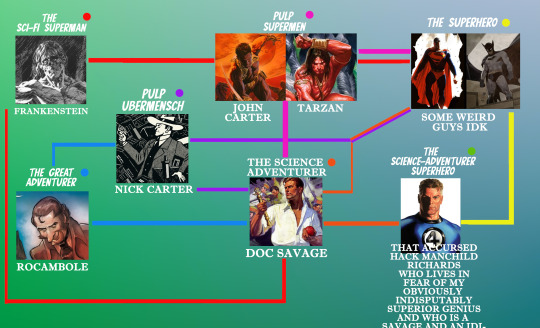
"Doc Savage" is recognizable in lots of other characters but there is a difference between specific pastiches or tributes or parodies of Doc (Doc Samson, Edison Rex, Jonas Venture), and characters who are evoking Doc Savage as his own archetype to draw initial inspiration from (Tom Strong, Bane, Clark Kent), and if we pull at Doc's roots we're gonna get to prior characters like Tarzan and Sherlock who were the ones to introduce or codify much of what are now commonplace superhero traits or the ones to introduce much of what Doc was originally pulling from.
I wanna draw some lines in the sand separating what is it that these characters brought to the table, in the road to get to Reed Richards and what exactly is it that Reed and Doc have in common vs things they have that are mainly taken from characters before them/grandfathered in their respective mediums. So let's go over the Archetypes here:
The Sci-Fi Superman: Coined by Peter Coogan. Through some strange birth or scientific intervention, these characters have superhuman powers and abilities that set them irrevocably apart from humanity, nearly forcing them to usually fall into the roles of saviors, rulers, destroyers, or ostracized/self-imposed hermits. Unless they find a purpose requiring said abilites, they cannot be permitted to exist and usually meet a tragic demise or is stripped of said power. Formative example is The Creature from Frankenstein (Mary Shelley), and others include Hugo Danner from Gladiator (Phillip Wylie) and Bill Dunn from The Reign of The Superman (Jerry Siegel). Coogan considers John Carter the first wholly positive and heroic SF superman, which is disputable, but more on Carter later.
Pulp Ubermensch: The Great Man turned do-gooding adventurer with a prosocial agenda. A human who is physically, mentally, and/or morally superior to those around him as a result of training/upbringing, skilled at everything the story requires him to, who applies his talents and abilities near-exclusively to fight evil. Formative example is Nick Carter (created by John R. Coryell and penned by Frederick Van Rensselaer Dey), who established much of what would eventually become pulp hero and superhero convention consequently.
The Great Adventurer: I'm naming these as a counterpoint to The Great Detective, the fantastical globetrotting adventurer/explorer hero who can go anywhere and do anything, who takes to the world as the detective takes to the city. The idea of a wealthy, offbeat, yet good-natured pulp hero who goes around righting wrongs with like-minded assistants. Formative example here is Rocambole (Ponson du Terrail), in most ways a definitive early Pulp Ubermensch, and arguably the first proto-superhero to assemble a gang of odd companions with a variety of talents and backgrounds to aid him, which is what both the Fabulous Five and the Fantastic Four can trace roots back to.
Pulp Supermen: Offshoots of the Sci-Fi Superman as adventure protagonists in serialized stories, where their superhuman natures and status are alleviated and redirected by the need of their capabilities somewhere or in service of something, and thus they get around the ruler/savior/destroyer fate by being heroes with a social calling akin to the Pulp Ubermensch, dedicated to use their powers near-exclusively to fight injustice without rocking the boat of society by their presence (or if necessary, assert dominion ONLY in a setting outside of human society, such as the jungle or Martian civilization). Distinguished from the Pulp Ubermensch by their greater larger-than-life explicitly superhuman abilities, that they don't need to be morally/mentally superior to the extent of a Pulp Ubermensch, and by the fantastical settings and tone of their adventures. Formative examples are John Carter of Mars and Tarzan of the Apes (both created by Edgar Rice Burroughs), with Tarzan quoted by Lester Dent as a specific influence on Doc (there are others but we're skipping most of those not relevant here)
The Science Adventurer: A frequently-used name to describe Doc Savage and Doc Savage-alikes. Doc Savage can be described, in archetype word salad terms, as a Pulp Superman who calls upon the Pulp Ubermensch's great man-ness and urban social calling, and who combines a Sci-Fi Superman origin and physical traits with The Great Adventurer's explorer disposition, righteousness and band of companions. The main thing that sets him apart from the characters listed prior is his focus on scientific prowess, technology, reasoning and polymathic skills, the importance of the "Doc" part of his name as it where.
The Superhero: you already know what these are and how they relate to the above. I've written a couple of things about the differences between pulp heroes and superheroes and it's a subject I'm of constantly mixed opinions on even regarding stuff I wrote, so I'm linking these two written a year apart if you want an idea of where those differences are.
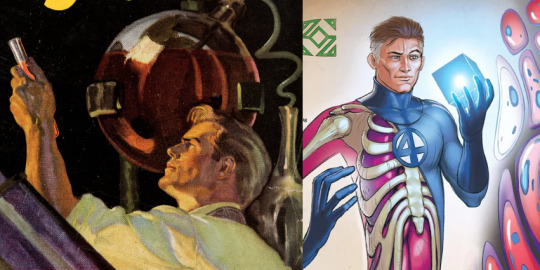
And so we get to Reed, who I'm naming a Science-Adventurer Superhero as a merger of the last two. Both Stan Lee and Jack Kirby mentioned several times that they read Doc Savage aplenty during the Depression and it shows in elements such as the Baxter Building (an expansion of Doc's headquarters in the Empire State Building - instead of just the 86th floor, The Four get the entire skyscraper), the specialized aircraft and vehicles, the fights and antagonism between the cantankerous and anti-social Ben Grimm and the smart-mouthed Johnny Storm mirroring the bickering spats between the bestial Monk and the silver-tongued Ham, and of course Beast from X-Men being more closeled modeled on Monk's ape-ish traits and scientific expertise (there's a fairly large argument to be made, that I think accounts for some of why Beast is, like that, in recent comics, that Ben Grimm and Hank McCoy both divided Monk Mayfair's every trait between themselves and ultimately flipped the script in the long run before taking it to the farthest extremes possible as polarized opposites of each other, with Ben initially getting most of the bad parts and making them the best ones, and Hank initially getting all the good ones and making them into the worst ones)
As far as I know, Reed Richards was not consciously modeled after Doc Savage (although Jack Kirby and Joe Simon's Private Strong used the origin story of a professor raising his son in a lab to be perfect in total isolation of other humans, which Lester likely may have pulled from Phillip Wylie's The Savage Gentleman to begin with), although it's commonly said that the direct precursors of the Four, the Challengers of the Unknown, were modeled after Doc Savage and the Fabulous Five's make-up. The members of the Fantastic Four are all based on 50s sci-fi archetypes, with Reed as the quintessential scientist, the grey-templed pipe-smoking patriarch frontman of the expeditions, and some creators over the years seem to have drawn upon Doc Savage as a model Reed. I'm thinking specifically of Mark Waid here, who openly named Doc Savage in his pitch bible:
The eternal problem with Scientifically Inclined Genius Adventures, the reason they don't ring true, is because in real life scientists spend all their damn time in the lab. Not Reed.
F'r pete's sake, we know he undertook all sorts of Indiana Jones missions as a younger man, we've seen that he actively enlisted in a war, and oh yeah, he stole a rocketship and tried to take it to the moon."
Tommy B put his finger on it when he suggested I stop thinking of Reed as the Professor from Gilligan's Island and instead think of him more like Doc Savage. When Reed encounters mental or logistic obstacles in his quest for knowledge, he thinks through them.
Doc Savage, of course, isn't the perfect model - he's a little more blood-and-gristle than Reed, more invested in the search for justice than for knowledge, and a little more "in the moment" as a general rule. Reed's more like Peter Weller as Buckaroo Banzai, they have the same aloof, detached nature. Unless active danger is staring him right in the face, Reed often seems a bit distant and not completely here because his mind is ten minutes in the future.
That addresses the Science-Adventurer aspect, which leaves us with the Superhero side of the equation.
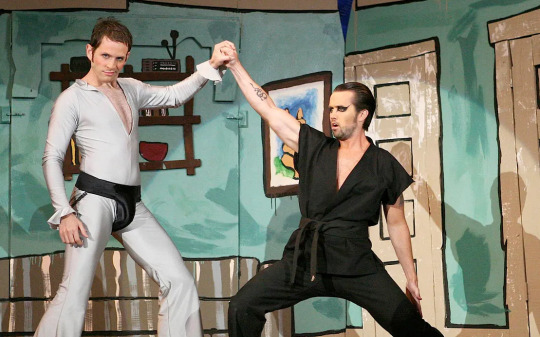
With Doc Savage you of course have one of the, if not the, main archetypal pulp heroes, a character that both Superman and Batman would take a great deal from, and "pulp hero" in itself is a term that exists to define these characters more so in relation to superheroes than what they were actually like in their own stories, time periods and mediums. The superhero as a concept is founded on Superman and Batman and their dychotomy. Costumed Avenger vs Ubermensch, mortal and immortal, light and dark, Dayman and Nightman (AHH-ahhh-AAHHHHH!), and that dynamic is specifically a result of Superman and Batman being direct descendants from Doc Savage and The Shadow respectively, who were Street & Smith's (and by extension the American pulps) Big Two, the top dogs of 1930s hero pulps, and direct opposites to each other.
Doc Savage was created in response to The Phantom Detective (who was the first successful Shadow imitator and thus defined it as the thing everyone was gonna have to do or respond to) and was in many ways a modernized revamp-almost-copy of Street & Smith's Nick Carter during his heyday, in origin and first case and super strength and omnicapable skills and general Great Man-ness and gadgetry and mission statement and so on. Doc was co-created by the editor of Nick Carter Magazine, John Nanovic, and the first response to the Phantom Detective that S&S planned was a reboot of Nick Carter as a generic hardboiled detective, published on March 1933, the same month as Doc's debut, and obviously Doc would go on to achieve much greater success and thus would popularize those traits again with himself as the figurehead archetype of them (not unlike what Superman and Batman would later do).
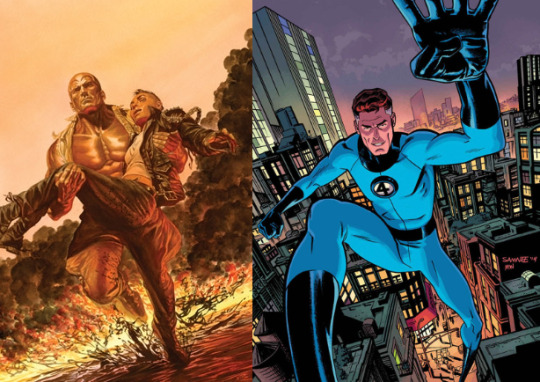
Unlike The Shadow, Doc Savage does not operate under a secret identity or mask. He is not the hidden master of the city and has no division between his alter egos, and because he performs in broad daylight as a celebrity, is theorically held to social scrutiny, and is fully sanctioned and approved by law enforcement and works with the authorities with public transparency (minus the crime college but let's just, not, for now), it greatly upends and affects the approach he takes to fighting crime. He only has one identity, the greatest man of all time as the stories will remind you at every turn, by his author's own words he "manifests Christliness", and while not much separates Doc Savage's skills from Nick Carter's, he is explicitly and textually framed as superhuman (even a "superman", that term was deployed a few times), and he operates in a contemporary, urban setting that most Pulp Supermen cannot touch without veering into Sci-Fi Superman territory.
Within the hero pulp format that S&S started with Nick Carter and renewed with The Shadow, with the scientific explorer angle, you could argue Doc Savage, in almost exactly the same way as he does in his stories, worked out the solution to an unfixable problem: Turns out you can be as over-the-top super as you want, so long as you have a procession of equivalent super menaces to fight, don't upset society (and if you do it, not where the public where can see, keep it a secret that you can be blackmailed over by crooks you will inevitably silence okay look I'll stop now), have whatever incredible miracle cures and achievements and charity you do work on take place off screen where you never have to deal with them too seriously, and know how to pick your fights.
His service to others resolves the ruler/savior/destroyer conundrum. Savage aids individuals who face problems beyond their control, does great work in advancing medicine and science, and alleviates suffering through charity work, but he leaves the institutions of society in place.
He faces a never-ending succession of villains threatening society, an eternal frontier of gangsters and super-scientific menaces who play the role that Indians take in frontier narratives. The unresolvable nature of crime makes this frontier eternal, so Savage can place his superiority in service to the community and never risk turning into a ruler, savior, or destroyer because he can find challenges sufficient to absorb his energies.
The Savage solution—the hero position would be adopted by the creators of other prosocial supermen to come, including Superman, although only the adventures of Superman would be set in contemporary America.
Thus instead of marking an end to the bourgeois domination of society, as Nietzsche foresaw, the superman serves to protect that domination through myth-narratives. - Superhero: The Secret Origin of a Genre, by Peter Coogan
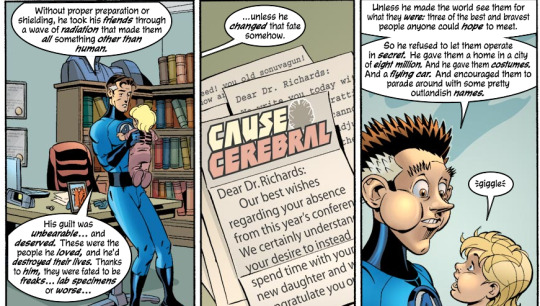
Reed Richards, in turn, is defined (INCORRECTLY, I say, feeling a plasma crackle barely miss my skull) as the smartest man on the planet, a mental superhuman who operates on a level above and beyond that of everyone around him, and a freak accident during a space travel grants him physical superhumanity to match, with his body able to morph and bend under his will. He alleviates the ruler/savior/destroyer conundrum Coogan described in much of the exact same way described above, kept busy with an endless procession of strange dimensions and aliens and supervillain challenges, and Mark Waid's famous confession scene in Fantastic Four #489 addresses the fate that looms over the Sci-Fi Superman directly, with the "very arrogant man who did something very stupid" pointificating to his toddler child just how necessary it was to ensure that the world would not fear and destroy the people he'd irreversibly mutated as a result of hubris, what is even the point of his grandstanding title and colorful outfit and public adventures and all that.
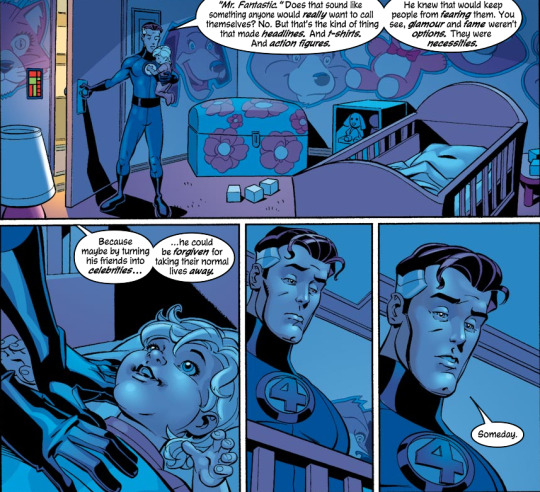
The life of superpowered adventurer celebrities was a necessity, and his superhero persona, Mr Fantastic, is a tabloid-catching act of penitence to mask his ultimate shame and to compensate the people he loves most. He lives for science, he craves discovery above all, but as far back as the Lee/Kirby stories, he still drags the team into awful intrusive press conferences none of them want to go but must, he sits through meetings with hardass generals to buy his team more leeway and trust, he takes the time to stretch across the city to visit sick children in hospitals and say hello to passing helicopters, he has to be the stick-in-the-mud dad who stretches himself thin to keep Johnny and Ben from ditching the team or seriously hurting each other (those first Johnny and Ben spats get way more violent than you'd expect), and he has to make difficult and even manipulative and harsh decisions even then to save the most lives he can. He carries a responsability to his family and loved ones first and foremost, and fashioning himself and them into superheroes is how he lives up to that responsability. It's what allows them to exist and thrive in-universe as much as out of it.
(We're not gonna play catch-up to the "why doesn't Reed Richards cure cancer" conversation but even that, in itself, is an extension of a thread that we can trace back to Doc and the Sci-Fi Supermen before him, when seams in the fantasy start showing with the introduction of consequence, a trend that particularly catches up to these scientist superhero characters who followed in Doc Savage's wake, and obviously caught up to Doc himself several times by now, for reasons @artbyblastweave describes as "a consequence of contemporary writers being Allowed To Notice And Unpack Things" and elaborates on very neatly here)
As a superhero, Reed Richards exists in conversation with Superman and Batman, same as every other character within the superhero "genre", which means he also exists in conversation with those traits borrowed from Doc Savage, and The Shadow, and all these other guys listed who were crucial in their development and a lot of others I'm leaving out of the conversation for now. A crucial part of that conversation and where the Fantastic Four figure into it is the fact that they were designed to not be traditional superheroes but to flip most if not all the conventions established on it's head, a part of that being their initial lack of uniforms (and when they did get uniforms they were just that, uniforms, rather than costumes), the lack of a secret identity, and the fact that the Four are scientists and explorers first, and crimefighting superheroes a distant second they're forced to frequently make a close second or first priority. Marvel made it's big defining pop culture splash with the Fantastic Four by turning superhero convention on it's head and doing as much as they could to do the opposite of what Brand Echh was doing.
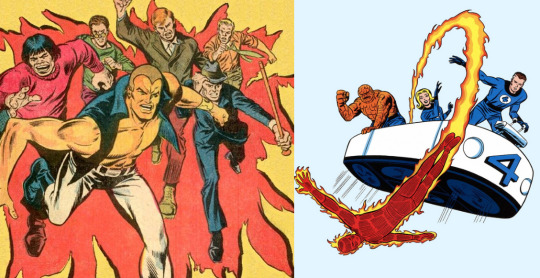
And that's kinda the main reason they end up inviting similarities with Doc Savage and other pulp heroes, because they're going out of their way to imitate and subvert traits and tropes that Superman and Batman were already imitating and subverting from those guys in the first place, that they in turn were imitating and subverting from guys that came before them, and etc.
Archetypes are breakthroughs, and no breakthrough happens in a vacuum. In the end, a lot of these strands and connections between these characters are less specifically the result of writers consciously following in the footsteps of Doc Savage and those that came before or alongside him, and more so with the fact that there's only so many left turns you can take before you just end up in a circle, or reinventing the wheel as it were.
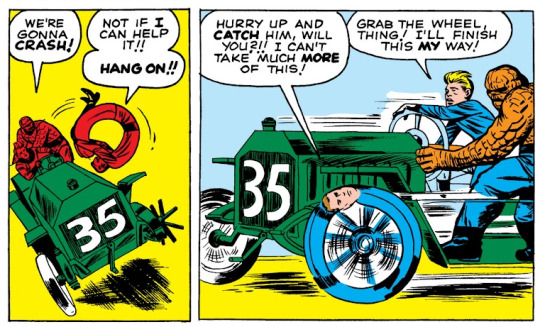
#replies tag#pulp heroes#pulp fiction#superheroes#marvel#marvel comics#doc savage#lester dent#reed richards#fantastic four#stan lee#jack kirby#mark waid#comics
73 notes
·
View notes
Note
The Caesar comment got my brain buzzing, mostly because Caesar took over modern civilization at the time by marching his troops on his own city. He wanted drastic change. History views him as the hero only because he was a “successful” dictator. (Lots of military poweress = land, gold, slaves, plus he followed after two morally AWFUL dictators while having some semblance of morality himself. Plus a tragic untimely death.). Caesar could have so easily have been a villain, had he not been followed by a very very successful adoptive son who ADORED him and venerated his name. I think Homie understands the parallels between himself and Caesar, considering what a history buff he is.
Anyways I am now pondering if he’s gonna try to take over the world ala the comics. An army of Supes led by him. What a silly lil guy!
honestly, I could write an essay on the show directly comparing him to Caesar. the man was fully aware of the conspiracy to kill him, but outright refused to take ANY precautions. even rejected body guard/escorts. when you think about Homelander's birthday speech, the attitude really falls in line.
if they're planning to continue the show without Homelander (boooooo), his death would absolutely martyr him to the supe army he's apparently raising. death is a flattering color on public figures.
while I don't think the show is headed for full on apocalyptic war (they don't seem to have the budget for that lol) i do think the divide is going to grow more intense than just Starlighters vs Hometeamers. the crazy thing being that most humans don't even realize the supe revolution is afoot.
it's not a matter of politics anymore. hundreds ( if not thousands ) of children (who're adults now) have been abused, experimented on and exploited. we're headed for a major upheaval, and Homelander is the king at the center of it.
#the issue is so much more complicated than i feel like even the show is really acknowledging#like gen v did a pretty terrible job of convincing anyone that cate was wrong#all they did was say 'ooo she's bad bc violence!! violence is never the answer!!!!'#THEY HAD CHILDREN IN CAGES FORMULATING DEADLY ILLNESSES ON THEM#homelander#ask and you shall receive
33 notes
·
View notes
Text
So I just finished Dungeon Meshi. The manga.
I am yet again blown away by the amazing story. I am also blown away by the fanfiction fandom and it's incessant need to ship anyone and everyone. I get it. You think some of the interaction are romantic. They aren't. That's not what any of this is meant to be. But I get it. Romance ships have their own place in the ecosystem and any healthy community has a dedicated group that really likes to ship anyone and everyone.
It becomes less healthy when I go to AO3 and you can go through pages and pages only finding like two or three fics that aren't ENTIRELY "Two random characters have the sex" with occasional romantic undertones. Of those three that aren't just that, two are instead "cleverly crafted AU but the focus is still on the secks". People I get it, it's nice, it's got, and by god everyone is horny for the Faligon x Marcille ship. I get it, I do.
But the story has so many interesting aspects to it! I'd go as far as to say it's a modern day Lord of the Rings! I really fucking would, and I love LotR like no other story on this fucking planet! I'm barely holding back from gushing about it right fucking now. I'm taking deep breaths.
Look, my point is, it's an amazing story about friendship and genuine camaraderie, the sort of thing that sends the message of "people can forget extremely strong bonds without having the hots for one another." The story, beyond it's generally tasteful comedy and the repetitive but reliable skits, is chock-full of meaningful messages, pondering and it has some of the most beautiful and tasteful conclusions to story arcs I've seen in a while! I'd go so far as to say it's fairly innovative as well, not unheard of but you don't see something this good all that often. You really don't. I usually obsess over just sticking FromSoft protagonists into everything to have them fuck around and mess with everything but for once I'm genuinely unappreciative of the idea. The conclusion to the story is perfect if very traditional in a certain sense and all in all it's got very few real flaws. In the end, a very simple, kind and good lad alongside his party of misfits saves the day and everyone gets to live happily ever after.
So why the shit is almost everyone only ever thinking about hot ladies or hot men fucking each other? No, actually, forget the distinction, it's irrelevant! Why is sex with a side of corny romance the only thing everyone is doing?! Fuck, make literally anything else! I get having a niche but for Christ's sake expand your horizons or something! FF doesn't even have the damn tag for the setting yet, AO3 is just porn and SpaceBattles only has Vs discussions and one single story ideas thread that I myself also sperged out in while I was only halfway done.
Christ, there are so many ideas in my head it's actually hard to focus! What about a serious setting examining the end of the story and how it could have gone on? Remake it into a tragedy, or just a feels-good epilogue that's only slightly longer than the story. How about tossing someone you KNOW would mess up the story into the story, but have it be so messed up it loops back around to the same end? Why not just do something really stupid and see where it leads? What if Laios and Kabru switched places? What if Laios and Falin were in Utaya when they were young (they're still the same people inherently just with a more tragic backstory) while Kabru is just some country schmuck that no longer has a tragic story to spur him on to the Dungeon? Does Kabru actually become even more of a textbook hero type? Would the Touden siblings let their past bog them down and make them gloomy or would it only make them more aware of the world around them and thus more willing to look at the other? The story establishes that they're inherently selfish people - they are of course also selfless, but the initial drive for the story is a selfish one for pretty much everyone. Laios just wants to look at and eat cool monsters. Falin wants to tag along and experience new things. Marcille wants to research ancient, forbidden magic. Chilchuck... Uh... Wants to make money and not be constantly scammed at best and backstabbed at worst, I think. Senshi just kind of wants to vibe. Izutsumi wants to stop being a beast-person and is by far portrayed as the most openly selfish in everything she does and decides.
The whole story is really about people being selfish and realizing that's no good, realizing that the people around them are PEOPLE and they should maybe consider each other more. That's how Laios learns to take responsibility, for instance. Oh sure some characters end up not ACTUALLY bring selfish at all, some of them right from the start even, but narratively until told otherwise we start off thinking everyone in the main group are first and foremost in it for themselves. The unifying moment and first instance of selflessness comes when they decide to immediately go rescue Falin - well, Shuro and Namari didn't but we don't know that right away.
Look what I'm saying is there's so many fucking themes in this story and what everyone is focusing on is sex. My argument isn't "sex bad", in fact. It's that the porn with plot - or even the tasteful romance stories - would be even better if you had some other nice fics alongside them. After all, if you eat the same thing the whole time it's bound to become boring eventually, but have a good spread and every part of the meal will be all the better in combination with other parts. If I just ate soup I'd be kind of disappointed, but make some simple rice and cook some simple meat for AFTER the soup and now both the soup and rice and meat feel so much better based on the other things I ate alongside them. Fics are the same. Please. I beg you. Give yourselves some diversity.
11 notes
·
View notes
Text
One thing that's becoming increasingly obvious is the running theme of Old vs New and how Team New is definitely winning. The whole thing about Jonathan and Mina being very young, like early twenties or something, and their youth being clearly reflected in their behaviour and this clashing with how immensely old Dracula is from his withering body to his ancient castle to the implied centuries of history he has lived through and personally participated in.
Dracula holds onto old ideas about useless peasants being nothing more than an endless supply of cannon fodder that he used to use as meat to throw at his enemies and now uses as food for himself (and his roomies) and there is also his thing about wistfully looking back on the history of his great house. He's happy that the house Jonathan found is old because a new one would have been impossible for him to live in. He has a grossly inflated sense of his own entitlement due to his noble status despite the fact that he is considered a dead man from an extinct lineage. He still considers himself as noble and respectable as he would have been hundreds of years ago, hence why he is so concerned about not being respected/revered in England, his predatory feasting on the local peasants as well as his treatment of Jonathan. Jonathan is a working man who is there in service of Dracula and therefore beneath him. Dracula can barge into his room whenever he wants, destroy his property, force him to acclimate to nocturnal life for Dracula's comfort and use him as a means to an end that will eventually die, in a way using him up just like he does with the local peasants. The way I see their relationship is that Dracula is possessive of Jonathan, not protective. To him, Jonathan is an object for his use that he has taken a fancy to, little more than an entertaining puppy or jester who means nothing in the grand scheme of things because he is hardly his own person, he is Dracula's. It's the same "I am noble therefore I matter and if you aren't noble you are here to be used" mindset that would have been acceptable in the ancient past he comes from but not in the modern day.
On the contrary, Jonathan and Mina are aggressively modern to the point where Jonathan explicitly mentions this when he's afraid ("19th century up to date with a vengeance"). They are young, they write in shorthand and (*SPOILERS FOR LATER ON IN THE BOOK*) there is one point in the story where Good Guy Squad needs to do a lot of blood transfusions which, at the time, was the Hot New Science and extremely modern, hence the complete disregard for blood types which weren't really a thing back then. Jonathan mentions that writing in shorthand would have confused the Count and therefore allowed him to send messages or keep writing that Dracula wouldn't have been able to decipher and being able to keep his shorthand diary does help keep Jonathan sane. Mina also mentions in her letter practising shorthand so she can keep diligent notes on the conversations she hears and oh boy I sure do wonder if that's going to be useful when someone needs to take notes on what happens in the rest of the book. The relationships between the heroes are also very, for lack of a better word, modern. Dracula and his roommates have a clear hierarchy that is very traditional but doesn't exist with the heroes. There is no one person in a position of power over everyone else in the group, including in the individual marriages. Neither Mina nor Jonathan have any more power over the other than the other has over them. They are equals, both mutually in love and mutually intelligent and productive. At the same time, it's fairly non-traditional for three suitors of the same woman to become very good friends. In most traditional narratives of gothic fiction you'd probably find a dual for the Lady's hand, a secret love, some kind of tragic heartbreak or something like that but these are "19th century up to date with a vengeance" young men who will not be so silly. Not to mention the fact that the group mostly comes together because of the relationship between two women which is refreshingly modern. The technology, attitudes, and relationships of the heroes are what set them apart from the Count as well as what lets them succeed.
I just love the dichotomy between the withered villain trying to relive the glory of the ancient past while desperately holding onto expired ideals of bygone days vs the modern and up-to-date heroes making full use of modern technology and stereotype-breaking to defeat him. In a way it almost spits in the face of the very common romanticisation of the past that is especially common in gothic fiction where the pretty old castles and cathedrals make people forget about the endless supply of downsides to those time periods and how horrifically nightmarish it would have been to live in those times if you weren't part of an extremely tiny group of extremely powerful people
#dracula daily#bram stoker#I'm so using this for my dracula dissertation next year#lmao catch me in the SQA headquarters bitches
56 notes
·
View notes
Text
the tragedy poll is so funny it'll be like [A FAMOUS EXAMPLE OF A TRAGIC HERO THAT CREATED A BLUEPRINT FOR MANY MODERN TRAGEDIES] vs. [CARTOON CHARACTER SOMETHING BAD HAPPENED TO] and they'll be neck and neck
11 notes
·
View notes
Note
you mentioned in a post that youre graduating college soon. what did you study? you seem like such an interesting person, please feel free to give a LONG answer haha
I originally wrote this answer in October before I graduated, but forgot to post it. My response:
Thank you, and thank you for the ask!
I’m majoring in English Literature. I’ve taken classes focusing on many different areas of literature, but my preference is for classic British literature from the 17th-19th centuries (especially Romanticism) which is mostly what I've studied, making me an outlier at my American uni which is more geared toward modern than classic pedagogy. I've also taken a few classes focusing on more modern lit subfields though, like environmental lit and cultural studies, and these have also been interesting and fruitful. I like to blend the old with the new.
Instead of pursuing a minor, to meet my credit quota I've taken electives in writing, history, anthropology, linguistics, and theatre. Pursuing a full minor would have kept me another semester. I have a lot of varying interests, and it took me a long time to decide on a major as a result. I chose to study literature because it’s extraordinarily broad, has many subfields, and often overlaps with or incorporates other disciplines I love (esp history).
The areas of literary criticism I’ve focused on have been Biographical, New Historicism, Psychological, and Psychoanalytical criticism, but I like and have used nearly all schools of criticism, except Formalism and New Criticism, both of which I abhor. Most of my classes have been very rooted in Poststructuralist theories and Deconstructionism.
Ideas I've spent a lot of time studying, taken from a list I keep:
Philosophical/moral: redemption, salvation, universal salvation, questions of responsibility, will, determination/resolve, free will vs fate - compatabilism - freedom/fatalism - freedom - liberation/oppression, self-fulfilling prophecies
Character types: Byronic Heroes, rakish stock characters, tragic heroes, morally gray characters, villainy, unlikeable characters
The material: Physical manifestations of mental states, Material culture, Space/environment, petrifaction themes - sculptural symbolism - creation from clay myths - the monumental - Mobility/immobility
Identity: the prevalent conflation of villainy/disability, alienation, abandonment, The grotesque vs the beautiful, perception, gaze
Death: Grief, death, suicide, literary afterlives, Hauntology
Criticism: Biographical, New Historicism, Psychological, Psychoanalytical
Freud’s psychoanalytical theories: id/ego/superego - sublimation
#ask#asks#literature#english literature#english major#lit major#literature major#lit#me#uni#uni life#university#university life#my writing
17 notes
·
View notes
Note
>Be me
>Get called a Nazis and abuse apologists for liking a certain villain and a enemies to lovers ship
>even though that villain and etl ship is like number 55 on the toxic shit I like
>Saying that I a Nazis apologist for the villains and assholes characters I prefer over the “good guys” in the fandoms centered around pop culture media
>The Israel/Palestine conflict got into mainstream media
>These fandoms centered around superheroes and such dehumanized the descendants of Holocaust survivors
>Never connected the dots that modern Israel was created as the result of the Holocaust aftermath
>Don’t look up that Palestines are brainwashed and at the mercy of a genocidal religious terrorist organizations
>Call the descendants of Abraham and Sarah “white colonizers”
>Infantilize Hamas terrorists because they had a “bad childhood” despite you guys bash the living FUCK out of people who prefer white male villains who have tragic pasts over the 2d dimensional cardboard heroes
>me now
>researching the surrounding areas and learning that this type of conflict been going around for centuries
>Surprisedly have more empathy and compassion to people who are connected to the Holocaust vs the “punch a nazi crowd”
I wonder how maybe Jewish people who though the punch the Nazis crowd care about them are going to”da fuck” that people like me (even though im autistic and working class) support them more despite for years saying I was the bad guy
…but then i remember despite how amazing BTAS, ATLA, Disney Gargoyles is, they and other stuff was created and owned by 500 fortune companies that want the maximum profit even before the woke persona
I still liked them…but at the end of the day they are kids oriented media and I still watch it. But I also a adult and my critical thinking skills went past the age of 14 thank you very much
Sorry it just…so weird how so many now “Free Palestine” people in fandoms called me a Nazi for several years…but I’m seemingly one of the few that give empathy on both sides.
Oh right I was raised not tolerated oops!
Lot of people have empathy for both sides, folks that would rather see everyone live and thrive together over there in peace and calm
Even if they have different ideas on how to accomplish that
but ya there do seem to be a large number of people that will get very upset if you show any empathy for one side or the other, which is just plain dumb.
5 notes
·
View notes
Text


PROPAGANDA
The Emperor
For starters, he was in a toxic gay romance that results in them trying to kill eachother, he lies but in the name of self defense, and hurts people in the name of the true greater good. He is more than willing to hurt people or lie to them if it means saving people en mass. He has owned thralls (his species keep people as flesh puppets, it's a whole thing) but cares for them. He is ultimate dilema of 'is it okay to do bad thing to save people' and I love him. Hes snarky and has dry humor. I somehow forgot he litterly had to eat brains to survive, I should mention that. He does however only eat back alley theifs, but he also cages them up in his basement. HE'S COMPLEX. I LOVE HIM. SO MUCH BRO.
Renfield
Mentally ill queer man writes mentally ill queer character. 200 years later, Dracula Daily happens and everyone in their mother immediately starts poking fun at him, demonizing him, or treating him like a naive child when none of these things are true. I could write a darn essay about Renfield and his role in the story. His status as a servant of Dracula is kept hidden from our heroes despite how obvious it is to the modern reader, and it turns into a striking example of dramatic irony. But at the same time, he's not a simpering servant; he's psychotic and Dracula feeds his delusion for his own gain. His death isn't a sacrifice, it's a tragic end to a story about the effects of isolation on the mind and the suffering that can come about from people refusing to listen to those who aren't like them. Pretty damned amusing, then, that absolutely no one seems to listen to the words that come out of his mouth.
#misrepresented morally grey#round 1#bracket c#both bracket#baldurs gate 3#the emperor#dracula daily#r.m. renfield
7 notes
·
View notes
Text
Hey all, I need help making a poor decision.
I am currently working on a Big+ writing project and, me knowing me, I will inevitably hit lulls where I lose steam/interest. I’ll usually circle back, but since I don’t want to waste those interim periods, I like to have a side story to chew on. While I have a good variety of percolating plots already, I very much still have Dracula on the brain. Counts and Harkers and what-ifs and maybes all over the place. Including one specific variation that’s been driving me crazy for weeks. You’ve probably seen others like the amazing @animate-mush floating the idea around already:
Jonathan Harker as the New Dracula.
Current general thought is having the story take place in the 90’s (with all that good clunky tech at the start of the Information Age). But for my purposes, it’s less a direct ‘1890s reflected in 1990s’ deal, and more ‘born in the 90’s/at the100 year anniversary of original death’ deal. The story would then take place in the 2010s, with everyone being 90’s babies grown into their early twenties. That aside!
It's basically taking Coppola’s reincarnation love interest plot and retooling it for a version that would actually make sense and play into the interesting untapped tragic ‘what-if?’ of a hero-slain Mina and vampiric Jonathan left all alone until Mina 2.0 (somehow) returns a century and change later. It would also be able to play into the ‘Modern Dracula adaptation’ plot line, as it would still involve Jonathan luring in and attempting to re-romance Mina 2.0 on his turf, effectively placing her in the same position Jonathan was in at Castle Dracula—albeit in a more genuinely caring, if warped/vampirically fixated way. It’s a juicy idea to play with!
But the issue is what happens after the big buildup and reveal. I can’t make myself get started without knowing how it’s meant to play out.
A) Go full Jonathan VS Himself, coming to grips with how he’s become his own monster by trying to entrap Mina 2.0 and drag her into his unlife. He tries to destroy himself, or to convince Mina 2.0 to do it.
She will, of course she will, he says. She was always the better of the two of them, he never deserved her perfect pure goodness, mush, mush, pedestals for her, self loathing for him et cetera.
All of this gushing has the opposite effect. Because Mina 2.0 is still Mina at her heart, and she finds she cannot raise a hand against her undead beloved any more than the living Jonathan had been able to do so against her a hundred years ago. She finds the same heartsick selfishness in herself that exists in her husband. The shoe is finally on the other foot, and she finds she cannot let him go either…
B) Same as the above, but with a full-scope Dracula-sized narrative including—WHAT’S THIS?—all of the main cast! All reborn into the modern day! With eerie exactness! From spirit to face to uncanny proximity and familiarity!
This version would be a more full-sized horror novel concept, complete with everyone uncovering the mystery of exactly who Jonathan the Dracula is, and exactly what his and their deal is. Who are all these reflections in the Victorian photographs? Why are they here again? And what is Jonathan the Dracula doing behind the scenes? Dramatic reveals abound, but the conclusion/epilogue features roughly the same bittersweet scene above for Jonathan and Mina, albeit with some convenient accident leaving both of them ~mysteriously unaccounted for~. The heroes, shaken but having survived, get to live their lives. And elsewhere, a young and claret-eyed couple checks into a honeymoon suite on the other side of the world. Newlyweds with sharp smiles.
Bonus spooky points for this version because Renfield—yes, he comes back!—gets to join the team as more of an equal, albeit by equaling and outdoing Van Helsing in the eerie knowledge arena. I’ve always pictured him as somewhat psychically sensitive, leaving him open to the Dracula radar he seems to develop while the Count’s messing with him, and I imagine this would lead to him catching onto the whole ‘We’ve been here before’ vibe. This leads to him gravitating to the group, starting out by stalking Jack 2.0 first, having the closest connection with him. Renfield being the resident madman (who was kind of right) in the original timeline gets translated into him being the resident conspiracy theorist who’s been collecting historic paraphernalia that connects a few too many dots for their present-day selves. Ominous!
C) ANOTHER TWIST! This one being purely to add more genuine danger to the cast and to be a nice self-serving treat to myself. I admit that. Because this version features, dun dun dun, Classic Dracula skipping out of Hell and getting his own return! One that’s far more quick-to-canniness than the others, knowing who he is at once, and making plans to get back to undead conquering, take overdue revenge on the reborn heroes, and (inevitably, because come on, IT’S A DRACULA FIGHT) duke it out with Jonathan. There’s a whole heap of lore and the ‘you kill it you bought it’ trope in play for his Scholomance powers and the Weathermaker title and yadda yadda.
But the gist is that, while Jonathan has remained more of an anti-villain/anti-hero for the past century, Dracula is still a bastard whether human or not. I like the concept of him turning up as a foreshadowed surprise. One who is also a red herring for some seemingly classically evil murders that the gang mistakenly pin on Jonathan…up until the power of Dates and Times and Paperwork comes in once again, and shows that Jonathan was in the wrong place, complete with witnesses, to have done the deed.
Cue a spark of Human Jonathan flaring up in recognition, ditto Mina and Renfield 2.0’s psychic prickling, realizing there’s someone familiar spilling/stealing blood.
Extra bonus points if we don’t get to suspect Dracula’s return right away because his reincarnation wasn’t as carefully curated as the heroes’ was (hello Jonathan playing with his new Dracula sorcery privileges). He got to come back and look entirely different; say, as a cultured, suave prettyboy of the modern day.
(No relation to Gary Oldman and Luke Evans and the 1000 other Sexy Suaveman Draculas. Honest.)
It turns into an uneasy reassembly of the original Drac Attack Pack versus the Classic Count, this time needing to do exactly as Jonathan had wanted to do a century ago: Send him to Hell forever, lest he resurrect himself again. Yes, it’s pure guilty fourth wall-cracking meta junk food at that point, but, like…that’s the point. And if every single Dracula show and movie in the past three decades can do their nonsense, so could I.
The climax is a big harrowing thing, Dracula the First is undone, but we still have to circle back to Jonathan and Mina’s predicament. Jonathan did very much do some murders in his past while he was trying to claw his way back to self-control—the difference between Count Dracula’s methodic and purposeful actions and the more kneejerk impulses of the Brides and the Bloofer Lady come into play here, all of it gets examined—and despite all the good he’s tried to do in tandem with that history, he thinks himself unworthy of redemption, let alone Mina.
Mina thinks otherwise. Blah, blah, holiest love epilogue. Aww.
ANYWAY.
I am not making guarantees on this one in the same way I’m trying with Barking Harker. There are oodles of ideas on the backburner for me to circle through as insulation between B.H. stints. But with the Jonathan the Dracula thing in particular, I’m frozen by indecision—depending on the ending, the foreshadowing and overall size of the story differs hugely. So I’d like to know what you guys think:
A) Short and bittersweet, focus solely on Jonathan and Mina in their private gothic vignette?
B) Heftier tale showcasing all the reincarnated cast—along with the reveal of exactly how and why that happened—and turn the whole thing into a part sequel/part revamp (ha ha) into a Modern Gothic Romantic Dracula?
C) B, but with a dash of taking the wind out of Sexified Dracula tales, having Original Dracula appear in his pretty new face and doing evil against the reborn heroes’ and Jonathan’s more nuanced side, getting destroyed once and for all (hint wink meta meta)?
I’m honestly stuck because they all feel a certain amount of right versus just fun, so it seems like they all have equal merit. Thoughts, feelings, ideas?
#in which I write about writing instead of writing#🙃#my writing#jonathan harker the dracula#jonathan harker#dracula bad ending#dracula#dracula daily
54 notes
·
View notes